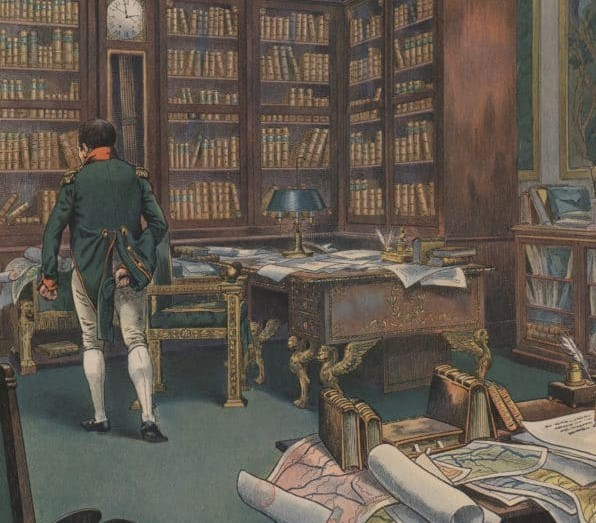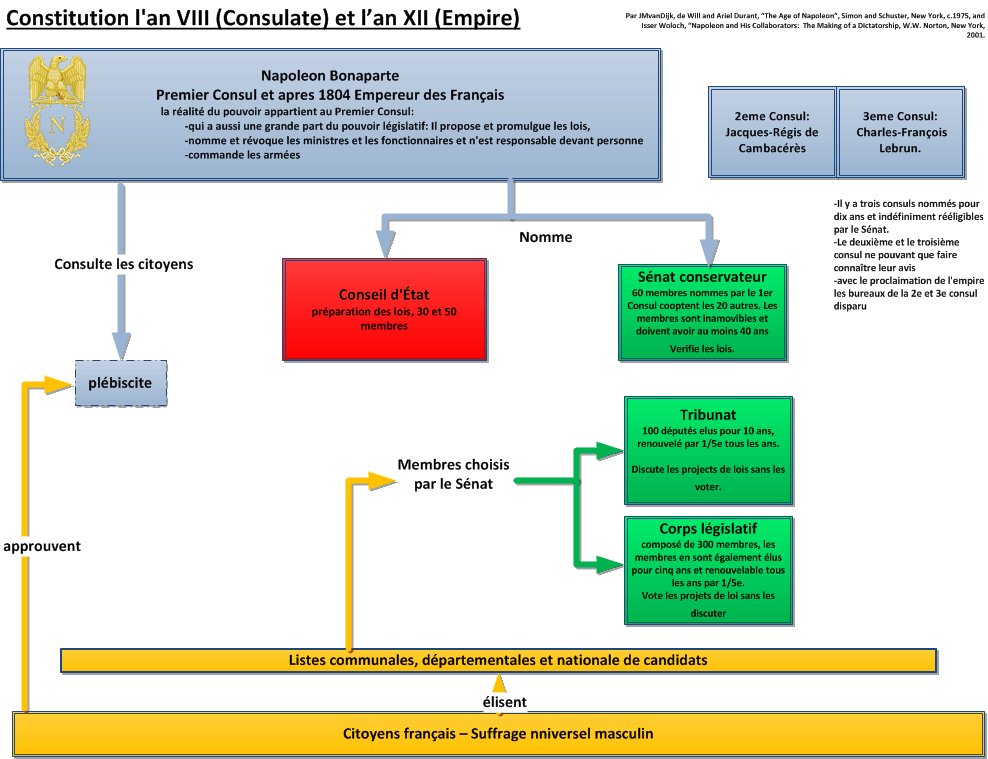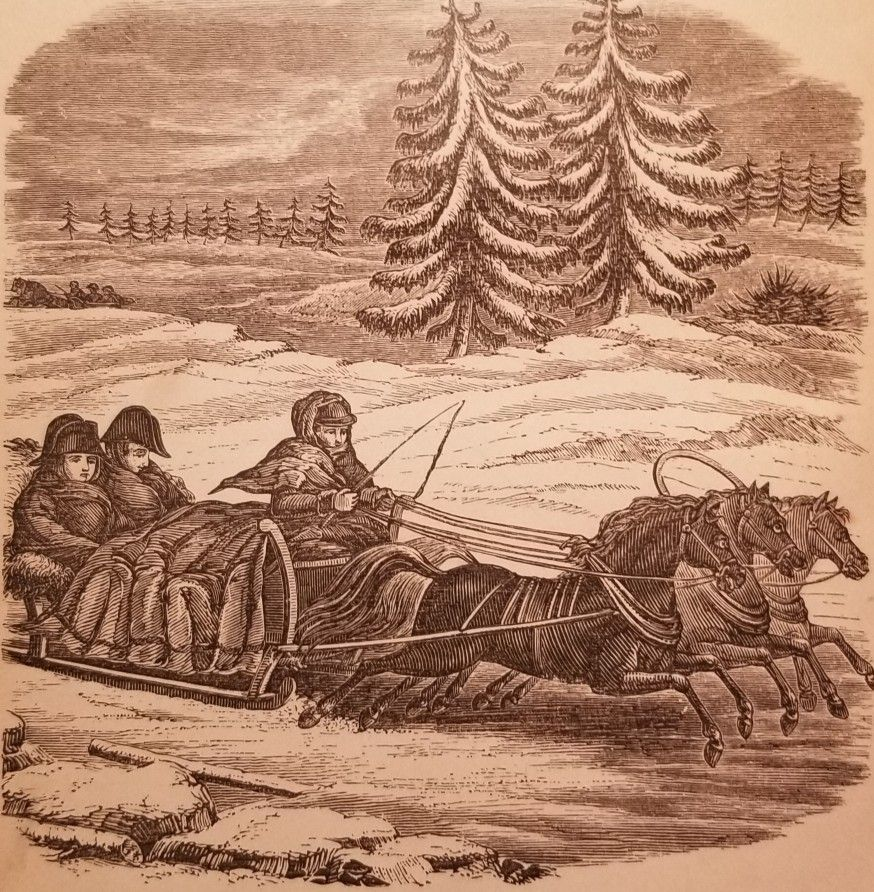
#OTD 19 December, 1812, Tsar Alexander left St. Petersburg to continue his campaign from Vilna, while Napoleon redirected his attention to strengthening his legitimacy in Paris.
Macdonald began his retreat when the main army finally found repose in Königsberg.
#Voicesfrom1812

Macdonald began his retreat when the main army finally found repose in Königsberg.
#Voicesfrom1812


Alexander could no longer tolerate Kutuzov, who, in his opinion, had wasted several precious opportunities to eradicate the Grande Armée and capture Napoleon alive.
He, thus, embarked on a long journey to Vilna, the town he had fled from during a ball at Bennigsen's mansion.
He, thus, embarked on a long journey to Vilna, the town he had fled from during a ball at Bennigsen's mansion.
Before his departure, he enjoyed a very cordial conversation with Germaine de Staël.
"He did not disguise from me his regret for the admiration to which he had surrendered himself in his intercourse with Napoleon," she wrote.
(Staël, Palmer)

"He did not disguise from me his regret for the admiration to which he had surrendered himself in his intercourse with Napoleon," she wrote.
(Staël, Palmer)


The Tsar "described with great sagacity the effect produced upon him by these conversations with Bonaparte, in which he said the most opposite things, as if one must be astonished at each, without thinking of their being contradictory." (Staël)
Staël, ascertained that his "noble soul cannot be twice deceived by the same person," could see that Russia would not repeat Prussia's mistake. She marvelled at his bearing, which she described as:
"Alexander gives and withdraws his confidence with the greatest reflection.
"Alexander gives and withdraws his confidence with the greatest reflection.

His youth and personal advantages have alone, at the beginning of his reign, made him suspected of levity; but he is serious, even as much so as a man may be who has known misfortune."
Alexander, then, lamented not having played "a great captain." (Ibid)
Alexander, then, lamented not having played "a great captain." (Ibid)

He also confessed his desire, "which all the world knows him to entertain, of ameliorating the state of peasants still subject to slavery."
Moved by such "noble modesty" of the Tsar, the émigré could not help but blurt out in praise of him:
Moved by such "noble modesty" of the Tsar, the émigré could not help but blurt out in praise of him:
"Sire...your character is a constitution for your empire, and your conscience is the guarantee of it."
Alexander replied, citing her third volume of the Considerations of the French Revolution:
"Were that even the case..I should only be a fortunate accident."
(Ibid)
Alexander replied, citing her third volume of the Considerations of the French Revolution:
"Were that even the case..I should only be a fortunate accident."
(Ibid)

John Quincy Adams summarized the day of Tsar's departure:
"The Emperor Alexander left this city early this morn ing to go to the army. There have been for some days rumors of his departure, but they were so much contradicted that it was finally quite unexpected."
"The Emperor Alexander left this city early this morn ing to go to the army. There have been for some days rumors of his departure, but they were so much contradicted that it was finally quite unexpected."
By coincidence, on the same day, Kutuzov wrote to Alexander that his army had underwent insurmountable losses, so much that "he was obliged to hide them not just from the enemy but even from his own officers." (Kutuzov to Alexander, Lieven)
Of the 97,000 men assembled by Kutuzov at Tarutino, only 42,000 still remained. Wittgenstein and Chichagov each had about 15,000, the detachments of Hertel, Sacken, and Essen about 25,000, and Palucci only 10,000. (Lieven, Wilson)
In terms of quantity alone, the Russians now outnumbered the 'Grand Army' by about ten times. But as the victors moved deeper into "a country devastated by the enemy," they "suffered nearly as much as they did from want of food, fuel, and clothing." (Wilson)
Just like the French, the Russians had bivouacked on the frozen ground before entering Vilna. Therefore, men were "obliged to relieve each other in their snatches of sleep, and to force up the reluctant and frequently resisting slumberers." (Ibid)
Many of their fingers, like the enemy's, had become too frostbitten to fire and reload muskets. If the patients made futile efforts to thaw their fingers in a bivouac fire, the frozen parts would develop gangrene. (Ibid)
The chief cause of increasing mortality among the Russians was "that the trousers becoming worn by the continued marches in the inner parts of the thigh exposed the flesh, so that the frost struck into it when chafed, and irritated it with virulent activity." (Ibid)
Vilna, in spite of its ample supply depots and restaurants, offered no haven for the common soldiers. According to Lowenstern, "the inflation here was monstrous," that "for a meal of three, every time for several days, we had to pay eight ducats."
(Lowenstern)
(Lowenstern)

In his private journal, Wilson depicted the lurid landscape of Vilna on the 18th:
"Painters and sculptors would be benefited by the specimens. Accustomed as I am to scenes of carnage and distress, it is a repeated picture that I loathe the more that I see of it.
"Painters and sculptors would be benefited by the specimens. Accustomed as I am to scenes of carnage and distress, it is a repeated picture that I loathe the more that I see of it.
...The enemy have a disease internally, occasioned by eating horseflesh without bread and salt, that carries off nine-tenths even of those who survive the field and epidemic sickness."
The masses of unburied corpses posed serious danger of infectious diseases to the newcomers.
The masses of unburied corpses posed serious danger of infectious diseases to the newcomers.
Wilson realized how "imagination cannot conceive the reality," mentioning an especially surreal sight:
"Yesterday I saw four men, grouped together, hands and legs frozen, minds yet vigorous, and two dogs tearing their feet."
(Wilson)
"Yesterday I saw four men, grouped together, hands and legs frozen, minds yet vigorous, and two dogs tearing their feet."
(Wilson)
Kutuzov, therefore, judged that the campaign has, and must, come to an end, unless Russia was willing to exact more sacrifices from itself.
But everything would depend on how Alexander perceives the strategic situation of now, and Russia's spiritual mission against Napoleon.
But everything would depend on how Alexander perceives the strategic situation of now, and Russia's spiritual mission against Napoleon.

In Paris, Napoleon woke up at 9 a.m., surrounded by all of his ministers and officers. (Fain)
He first ordered Caulaincourt to take over the Ministry of Foreign Affairs during Maret’s absence, and update him on the latest correspondences and treaties with Austria and Prussia.
He first ordered Caulaincourt to take over the Ministry of Foreign Affairs during Maret’s absence, and update him on the latest correspondences and treaties with Austria and Prussia.

Caulaincourt, to Napoleon’s surprise, requested that his task be delegated to Gouey, comte de La Besnardière. The reason for his rare refusal was:
“I was wearied from the fourteen nights I had spent on the que vive, without a wink of sleep, and in a measure depressed,
“I was wearied from the fourteen nights I had spent on the que vive, without a wink of sleep, and in a measure depressed,
by the sense of the responsibilities that such a journey, made under such circumstances, had heaped upon me. Apart from that, moreover, I had been heavily preoccupied lest something happen to the Emperor, who had entrusted himself to my care and good faith.”
(Caulaincourt)
(Caulaincourt)
The levee began at 11 a.m., where Caulaincourt still appeared. Napoleon first summoned Clarke, Minister of War, Lacuée, Minister of the Administration of War, State Councilor Gassendi, and Chief of the Artillery Office Evain.
(Fain, Caulaincourt)

(Fain, Caulaincourt)


Just a day after his comeback, Napoleon set about issuing all possible orders to replenish his arsenals, and eventually his army as well. (Fain)
To Decrès, Minister of Marine, and Lacuée, he spoke of his cataclysmic failure “as a stranger might have done”: (Caulaincourt)
(More)

To Decrès, Minister of Marine, and Lacuée, he spoke of his cataclysmic failure “as a stranger might have done”: (Caulaincourt)
(More)


“Well, well, gentlemen, Fortune dazzled me. I let myself be carried away, instead of following the plan I had made and that I spoke of to you. Monsieur Cessac. I have been to Moscow. I thought to sign peace there. I stayed there too long.
I had thought to gain in a year what only two campaigns could achieve. I have made a great blunder; but I shall have the means to retrieve it.”
He repeated the same narrative to Caulaincourt, who swore not having missed transcribing every jarring word out of the Emperor's mouth:
He repeated the same narrative to Caulaincourt, who swore not having missed transcribing every jarring word out of the Emperor's mouth:
“The venture failed by a week’s time…Everything in the world depends on that. The right moment, timeliness, those are everything.” (Caulaincourt)
He was impatient to notify his temporary successor, now headquartered in Königsberg, of his apparatus of war in repair.
He was impatient to notify his temporary successor, now headquartered in Königsberg, of his apparatus of war in repair.
He wrote to Murat, after changing the date to the 18th for reason unknown:
“We are ready to make all kinds of sacrifices and I am constantly busy reorganizing all my means. I already have an army of 40,000 men in Berlin and on the Oder.”
(Correspondences)
“We are ready to make all kinds of sacrifices and I am constantly busy reorganizing all my means. I already have an army of 40,000 men in Berlin and on the Oder.”
(Correspondences)
He assured his brother-in-law that Prussia and Saxony had already guaranteed reinforcements which would “replenish all his cavalry,” and that “Königsberg and the Pragel will offer you resources that you will not find if you are cornered beyond.” (Ibid)
Napoleon was still incensed at Miloradovich for flaunting “all the interviews” which had loosened Murat’s guard at Tarutino. (Ibid)
Coincidentally, it was just around then when Napoleon had entertained an equally unrealistic plan: ‘the Petersburg Campaign’ of 1812.
Coincidentally, it was just around then when Napoleon had entertained an equally unrealistic plan: ‘the Petersburg Campaign’ of 1812.
The former Grand Equerry did not miss the levee, where people, to borrow his words, “crowded around and made much of me, as though I had been a favourite—as though I were a man with influence, who had just spent fourteen nights and as many days tête-à-tête with Authority.”
But above all, these people appeared to seek his confirmation whether “the dreadful bulletin” was indeed true.
As a matter of fact, it “had produced so strong an impression,” that all were craving for “some news of their dear ones.” (Caulaincourt)
As a matter of fact, it “had produced so strong an impression,” that all were craving for “some news of their dear ones.” (Caulaincourt)
None dared to speak up a word about the calamity, for the news had “produced so woeful a sensation.”
In contrast, the Emperor looked as healthy as he claimed, except for legs “a little bloated,” puffy eyes, and “skin…tanned by the cold.” (Ibid)
In contrast, the Emperor looked as healthy as he claimed, except for legs “a little bloated,” puffy eyes, and “skin…tanned by the cold.” (Ibid)
When Napoleon appeared before all the notables of the court, the first thing he did was to hold individual interviews with “these submissive ministers, whom he had so disdainfully treated from the height of unexampled prosperity.” 

The subject matter of those knife-edge sessions did not clarify the ministers about what had befallen those still on the retreat; after all, like Caulaincourt lamented, “he, like everyone else, knew nothing of the worst disasters.” (Caulaincourt)
Instead, he voraciously inquired each about the origins of Malet’s conspiracy. According to Fouche, he then went to “closet himself with Cambaceres in a long and secret conversation,” then with Savary, “whom he overwhelmed with questions and reproaches.”
Cambaceres and Savary, as well as other ministers, concurred that the coup had only been an isolated, not a systematic incident. (Fouche) It was so unexpected that all, including even Savary himself, “had been completely taken unawares by that bold conspirator.” (Thiers)
The two architects of the Consulate stressed that “the greatest danger he had to fear, and against which he should be on his guard, was in the reminiscences of the republic. (Fouche)
Still, none of them could provide a satisfactory answer to the much repeated question:
Still, none of them could provide a satisfactory answer to the much repeated question:
Why had none of the highbrows, following Malet’s announcement of the Emperor’s death in Russia, upheld the King of Rome as the successor? The legitimacy of his throne, Napoleon acutely felt, was in jeopardy.
The private conference lasted until 1 a.m.
(Fouche, Fain)
The private conference lasted until 1 a.m.
(Fouche, Fain)

As for the the King of Naples, entrusted to rally the army in the absence of Napoleon, he was less interested in his immediate duty than preserving his own throne.
Fortunately, the hurrahs began to disappear as the runaways started entering Königsberg on the 19th.
Fortunately, the hurrahs began to disappear as the runaways started entering Königsberg on the 19th.
Murat, like the Oudinots who had preceded him, "was coldly received by the chief authorities of the town."
"This first great town on the road, according to Labaume, "became crowded with fugitives from Russia, who hoped to restore within its walls their exhausted energies."
"This first great town on the road, according to Labaume, "became crowded with fugitives from Russia, who hoped to restore within its walls their exhausted energies."
All the "cafés, the restaurants and the hotels" proved "utterly inadequate to meet the demands upon their resources."
But the men indulged in "the delicious sensation of being able to protect oneself" after "six months of dreadful privations and unutterable misery." (Labaume)
But the men indulged in "the delicious sensation of being able to protect oneself" after "six months of dreadful privations and unutterable misery." (Labaume)
Here, Murat assigned the intermediate stations for each unit; the V Corps to Warsaw, VI to Plock, I and VIII to Thorn, II and III to Marienberg, IV and V to Marienwerder, the Guard to join Henderlet's reserve at Insterburg, and finally, his headquarter to Elbing.
(Wilson, L.)
(Wilson, L.)
With Napoleon’s attention immediately absorbed into his exaggerated perception of domestic crisis, and Murat busy extricating himself from the badlands, Macdonald became all but forgotten.
On the 19th, the marshal finally ordered his X Corps to start retreating in four columns.
On the 19th, the marshal finally ordered his X Corps to start retreating in four columns.
The first columns, leaving on the day, consisted of the French division under Grandjean and six Prussian battalions under Massenbach, both encamped between Mittau and Bausk. The Polish and Westphalian detachments in Iecava also joined them.
(Hartwich, Clausewitz)
(Hartwich, Clausewitz)
Those behind, scheduled to follow on the morrow, were all the remaining Prussian forces commanded by Yorck and Kleist. (Ibid)
Macdonald "was already aware that the enemy's scouts were crossing Samogitia behind," as well as his irreparable fallout with Yorck. (Macdonald)
Macdonald "was already aware that the enemy's scouts were crossing Samogitia behind," as well as his irreparable fallout with Yorck. (Macdonald)
With the passage to Tilsit attenuating each day, "the last army, the only one which remained unbroken, was exposed to the risk of destruction."
In this precarious situation, Macdonald strived to preempt the worst scenario-the Prussians' mutiny in the middle of the road. (Segur)
In this precarious situation, Macdonald strived to preempt the worst scenario-the Prussians' mutiny in the middle of the road. (Segur)
By this calculation, the Prussian army was sent out in two separate bodies, with Massenbach's forces detached to Bachelu's 3rd French brigade. Together, they formed the vanguard and led the way by Teletz and Szawlia towards Tilsit. (Ibid, Clausewitz) 

Macdonald thus decided:
"I fully expected to meet every sort of obstacle, and resolved to overcome them all. The most serious matter was not the enemy, but the River Neman. The bridge had been removed on account of the ice, and if the thaw began all my efforts would be in vain."
"I fully expected to meet every sort of obstacle, and resolved to overcome them all. The most serious matter was not the enemy, but the River Neman. The bridge had been removed on account of the ice, and if the thaw began all my efforts would be in vain."

@threadreaderapp Unroll.
• • •
Missing some Tweet in this thread? You can try to
force a refresh

















